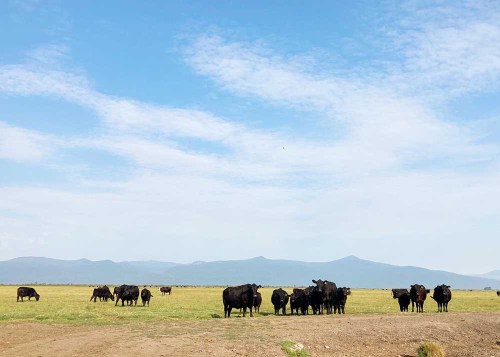Regenerative ranching program lands $10M USDA grant
Published 11:45 am Friday, September 16, 2022

- A ranch in the Klamath Basin. Sustainable Northwest has received a $10 million grant from the USDA to implement the largest climate-smart regenerative beef production program in the West.
PORTLAND — The USDA is providing $10 million to help establish what advocates say will be the largest program to promote climate-smart ranching in the West.
Sustainable Northwest, a Portland-based nonprofit, is working with Country Natural Beef to adopt “regenerative” agricultural practices at 120 ranches across nine states, covering more than 7 million acres of public and private rangeland.
Regenerative agriculture refers to methods of farming and ranching that build soil health, improve water retention, increase biodiversity and sequester carbon from the atmosphere.
In the case of beef production, ranchers may consider rotational grazing of cattle, where the animals are rotated frequently between pastures. This allows forage and grasses to recover more quickly, replenishing organic matter in soil while preventing erosion.
“This is the next generation of climate action,” said Dallas Hall Defrees, regenerative ranching program director for Sustainable Northwest. “How can we ensure that the food we eat is storing and reducing greenhouse gases, enhancing ecosystem processes and supporting family- and tribal-run ranches?”
Funding comes from the USDA’s Commodity Credit Corporation through the Partnership for Climate-Smart Commodities Program, which allocated $2.8 billion for 70 projects in all 50 states, plus the District of Columbia, Puerto Rico and tribal nations.
The Partnership for Climate-Smart Commodities also provided $50 million to Oregon State University, which is collaborating with Washington State University, the University of Idaho and Northwest farms and tribes to improve soil management.
Earlier this year, Sustainable Northwest also received a $488,500 grant from the M.J. Murdock Charitable Trust to roll out its regenerative ranching program with Country Natural Beef.
Country Natural Beef is headquartered in Redmond, Ore., and is the country’s largest beef production co-op.
Program leaders predict they will reduce the carbon intensity of beef production by 50-100% compared to conventionally-raised beef; sequester enough carbon every year to offset 1 billion gallons of gasoline or 10 billion pounds of coal; and provide $67 million in annual increased market returns for producers.
Country Natural Beef will market this meat under the name “Grazewell.” The co-op sells to well-known regional and national restaurants and supermarkets including Whole Foods, New Seasons Market and Burgerville.
“Our ranchers have always taken good care of the land,” said Dan Probert, a Wallowa County rancher and marketing director for Country Natural Beef. “But this grant helps us measure and show the world that our practices help promote soil and plant health, promote wildlife habitat and much more.”









